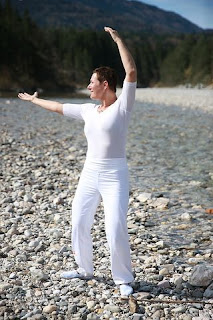I tend to be addicted to exercise and want to always do the aerobic or weights so I feel as if I've actually had a workout. I like "knowing" I worked out but I know that I need some down time so when I "need" to exercise, I switch to yoga and tai chi. I actually like the tai chi but I've often wondered why it is considered good for me since it tends to be so slow and methodical.
Originally, tai chi was not used as a form of exercise, it was actually a form of self defense but over time it changed focus. Tai chi is made up of slow, flowing movements that are almost like meditating. It is classified as a system of gentle exercise and stretching and is self-paced.
Furthermore, there are several different variations of tai chi. The focus can range from health to the martial arts origin. It is different from yoga in that yoga has postures and breathing techniques. The good thing is that tai chi is a low impact form of exercise and puts minimal stress on joints and muscles so it is good for all ages and levels of fitness. However, it is recommended that people check with their doctors before taking it up.
Although it is a slow exercise, it has multiple benefits such as decreasing stress and anxiety, improves the mood, improves aerobic capacity, increases stamina and energy while improving flexibility, balance and agility. It also helps improve muscle strength while defining muscles. In addition, there are indications that tai chi can also help you sleep better at night, helps lower your blood pressure by reducing stress, decreases the risk of falling in older adults because it improves balance, and helps over all health.
There has been some research done on the benefits of tai chi. One study indicated that tai chi provided the same amount of stress relief as regular exercising. This is thought to be due to the meditation that is included in tai chi. It has also been observed that people who regularly practice tai chi have noticed a reduction in the symptoms associated with anxiety and depression. It is thought that the slow, purposeful movements combined with deep, slow, breaths positively effect the nervous system and hormones that regulate mood and help people sleep better at night.
Furthermore, there are indications that practicing tai chi can help people lose weight without doing anything additional in their routine. In addition, it appears that tai chi improves cognitive ability in older adults because it effects memory, paying attention, and carrying out complex tasks. Another reason for older people to take tai chi is that it helps improve balance while reducing the fear of falling due to an increase in confidence.
Overall, tai chi is considered a safe exercise with few side effects. Although there are DVD's available for learning tai chi, it is strongly recommended you find a class in your area so you get the full benefit of having a in person teacher. This is especially true if you have health issues and may need alternate movements because you can't do certain movements.
In general, there are five major styles of tai chi. The Yang style of tai chi is filled with slow, graceful movements for relaxing and it is a good style for beginners. The Wu style focus on micro movements so it is extremely slow. The Chen style combines slow and fast movements and might be difficult for beginners. The Sun style also combines slow and fast movements like the Chen style but has less crouching, kicking, and punching so it is less demanding. Finally there is the Hao style is the least used since it focuses on accurate position and internal strength.
It is possible to experience benefits for short term use of under 12 weeks, so it's recommended one get in the habit of doing it regularly for longer periods of time. It is suggested one practice tai chi at the same time every day but if that isn't possible, do it when you can, even just imagining in your mind when you are stuck in traffic.
So if you want something that isn't too strenuous to start with, look at tai chi. On Wednesday, I'll be exploring the benefits of yoga since it is also exercise that doesn't seem like exercise.

No comments:
Post a Comment